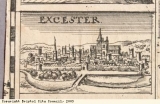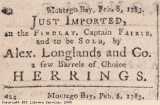The south west ports of England
The first English slaving expedition left the town of Plymouth on the south west coast of England in 1562, under John Hawkins. He captured, rather than bought, 300 Africans, whom he sold in the Spanish island of Hispaniola (now Haiti/ Dominican Republic), in the Caribbean. Plymouth was an important naval port, used by the merchant fleet mostly in time of war. Most of the slaving voyages from here were organised by merchants from other towns, using Plymouth as a convenient port.
Exeter was given royal permission, through a charter (a special licence), to trade with Africa in 1585. At this time, only certain people could trade with Africa, due to tight controls put in place by the government. Merchants at this time were buying gold and ivory, not slaves. Exeter merchants in the 18th century invested in a few slaving voyages out of the port, but preferred to invest in ventures from London or Bristol.
Topsham is a coastal town near Exeter in Devon. Its involvement in the slave trade began and ended badly for the six owners of the ship the Dragon. A voyage in 1699 had a cargo of slaves that was worth £400 (£20,000 today). The slaves rebelled on board the ship whilst it was still at the African coast. An agent in Africa from the London-based Royal African Company (a slave trading company), then used the voyage to ship his own slaves to the Caribbean. The owners of the ship from Topsham had only 14 enslaved Africans on board to sell when the Dragon arrived on the island of Barbados in the Caribbean.
Merchants in the town of Dartmouth, also in the south west, invested in a few slaving voyages early in the 18th century. One voyage, of the ship the Dartmouth in 1709, failed to cover its costs. Its owners, who were all merchants from nearby Exeter, never tried the trade again.
Bideford, in north Devon in the south west, had a large trade to the American plantations. This was due to the local Grenville family who had financial investments in the southern states of Virginia and Carolina in America. Ships from Bideford carried large numbers of white servants to the plantations, to work for a fixed number of years. This was before the labour force on the plantations was brought from Africa. Merchants in the towns of Bridgewater and Minehead in the south west probably invested in the slave trade through voyages out of Bristol. This was certainly true of merchants in Bideford.
Thomas Corker of Falmouth in Cornwall, in the south west, became an agent of the Royal African Company in Sierra Leone, West Africa. He lived there and married an African woman, and their sons became important men in the area. The family supplied enslaved Africans to traders throughout the 18th and 19th centuries. Merchants from Falmouth also specialised in the luxury trade to the Caribbean and American plantations. They took high value goods such as silks and wines, rather than low value goods such as window glass, to the plantations for sale.
Minehead and Bridgewater, in the county of Somerset, were fishing ports in the south west. The towns’ fishermen caught herring fish. Salted herring and cod were used on the Caribbean plantations, imported to feed the slaves. Pictured here is a newspaper extract from The Cornwall Chronicle, Jamaica. It is an advertisement for herrings that had just been imported from Britain. Dried or salted herring were exported to the Caribbean islands, such as Jamaica, and sold as food for slaves on plantations.
The fish was in addition to the food that the slaves grew for themselves, such as beans and vegetables. The two fishing towns of Minehead and Bridgewater supplied herring to the Caribbean plantations. Local merchants also invested in slaving voyages from Bristol, not out of their own ports.




